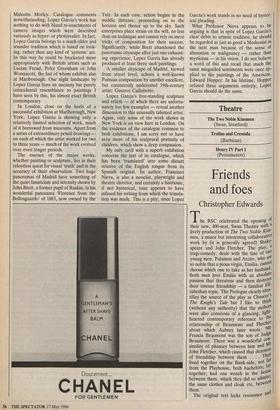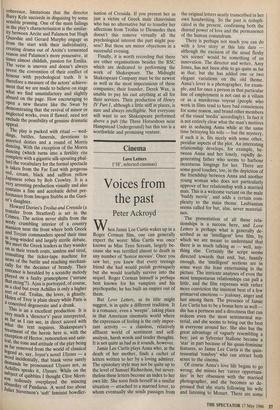Theatre
The Two Noble Kinsmen (Swan, Stratford) Troilus and Cressida (Barbican) Henry IV Part 1 (Pentameters)
Friends and foes
Christopher Edwards
The RSC celebrated the opening of their new, 400-seat, Swan Theatre with a lively production of The Two Noble Kins- men, a minor but interesting collaborative work by (it is generally agreed) Shake- speare and John Fletcher. The play; a tragi-comedy, deals with the fate of tw° young men, Palamon and Arcite, who are so noble that a pious virgin, Emilia, cannot choose which one to take as her husband. Both men love Emilia with an absolute passion that threatens and then destroys their intense friendship — a familiar Eli" zabethan topic. The Prologue clearly iden- tifies the source of the play as Chaucer 's The Knight's Tale but I like to think (without any authority) that the authors were also conscious of a glancing, 1411,_t- hearted contemporary reference to the relationship of Beaumont and Fletcher about which Aubrey later wrote: `Mr Francis Beaumont was the son of Judge Beaumont. There was a wonderful c° simility of phansey between him and Ivo John Fletcher, which caused that dearness of friendship between them . . . • They lived together on the Bank-side, not '", from the Playhouse, both bachelors; 137 together; had one wench in the house between them, which they did so admire; the same clothes and cloak etc, between them.' and The original text lacks resonance a coherence, limitations that the director Barry Kyle succeeds in disguising by some sensible pruning. One of the main failings in the play's characterisation is the similar- ity between Arcite and Palamon but Hugh Quarshie and Gerard Murphy engage us from the start with their individuality, creating drama out of Arcite's tormented reason and Palamon's more possessive, at times almost childish, passion for Emilia. The verse is uneven and doesn't always invest the convention of their conflict of honour with psychological truth. It is therefore a measure of the actors' achieve- ment that we are made to believe on stage what we find unsatisfactory and slightly absurd on the page. How encouraging to open a new theatre like the Swan by demonstrating that the revival of minor or neglected works, even if flawed, need not exclude the possibility of genuine dramatic appeal.
The play is packed with ritual — wed- dings, battles, funerals, devotions to assorted deities and a round of Morris dancing. With the exception of the Morris dancing (which turns into a fertility rite complete with a gigantic silk-spouting phal- lus) the vocabulary for the formal spectacle is taken from the Far East with gorgeous red, cream, black and saffron yellow Japanese robes by Bob Crowley. It is a very arresting production visually and also contains a fine and acrobatic debut per- formance from Imogen Stubbs as the Gaol- er's daughter. Howard Davies's Troilus and Cressida (a transfer from Stratford) is set in the Crimea. The action never shifts from the seedy crumbling interior of a country mansion near the front where both Greek and Trojan commanders spend their time in long-winded and largely sterile debate. We wander on the Greek leaders as they wder i On n their trench coats, aimless and tired, consulting the ticker-tape machine for news of the battle and reaching mechani- cally for the decanter of brandy. Their entrance is heralded by a scratchy melody Played on a faulty gramophone (`untune that string'?). Ajax is portrayed, of course, as a clod but even Achilles is only a higher sort of oaf. Troilus, the lover, is ghastly. Helen of Troy is plain sleazy while Paris is a conceited degenerate and a drunk. This is an a excellent production. It is very much a 'director's' piece interpreted, as far as I can see, in direct accord with What the text requires. Shakespeare's treatment of the heroic here is, with the exception of Hector, remorseless and satir- ical, the tone and attitude of the play being legend far removed from the world of classical legend as, say, Joyce's novel Ulysses — a word incidentally, that blank verse surely demands be pronounced Ulysses not, as Achilles speaks it, Ulysses. While on the subject of quibbles I thought Clive Mem- son tediously overplayed the mincing absurdity of Pandarus. A word too about Juliet Stevenson's 'soft' feminist bowdler- isation of Cressida. If you present her as just a victim of Greek male chauvinism who has no alternative but to transfer her affections from Troilus to Diomedes then doesn't this remove virtually all the psychological interest the part might pos- sess? But these are minor objections in a successful evening.
Finally, it is worth recording that there are other organisations besides the RSC which are dedicated to performing the work of Shakespeare. The Midnight Shakespeare Company must be the newest as well as the most impecunious of these companies; their founder, Derek Wax, is unable to pay his cast anything at all for their services. Their production of Henry IV Part 1, although a little stiff in places, is sure and always intelligible. Not everyone will want to see Shakespeare performed above a pub (the Three Horseshoes near Hampstead Underground) but this too is a worthwhile and promising venture.



















































 Previous page
Previous page